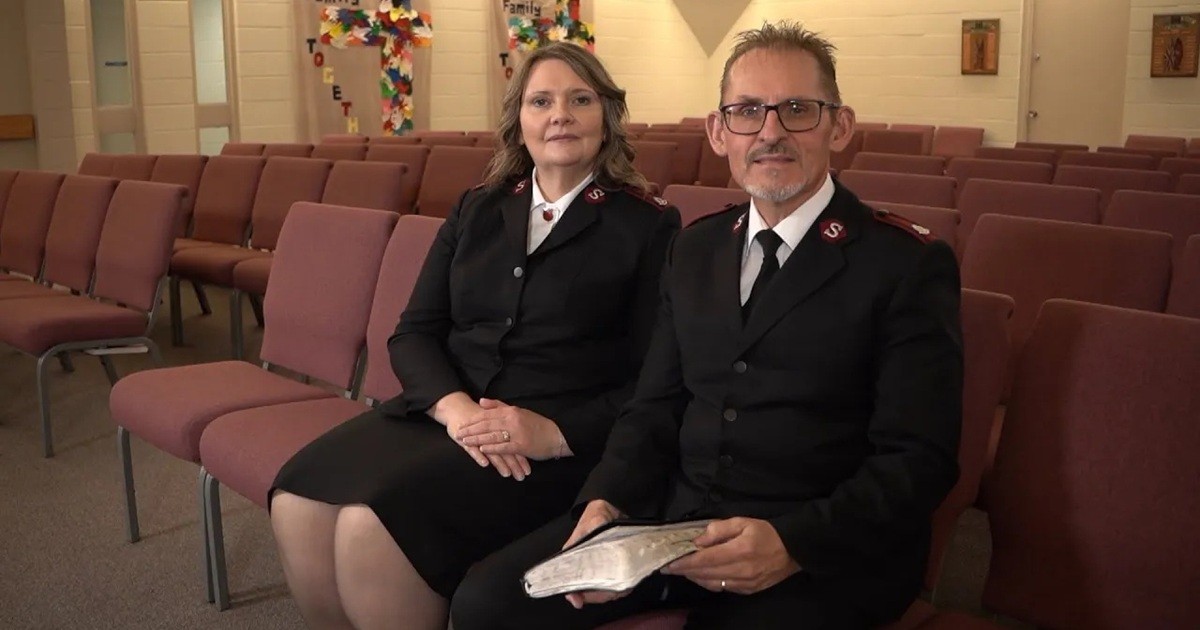 The Salvation Army has a colourful history of using pithy statements to summarize the enormous mission that it has in the world. When I first encountered the Army in the 1980s, the slogan “Heart to God, Hand to Man” was used extensively. In 2000, General John Gowans (Rtd) attempted to capture the raison d'être of The Salvation Army with a phrase that resonated with officers and soldiers alike. He said that the Army exists to “save souls, grow saints and serve suffering humanity.” But perhaps my favourite expression came from the lips of our Founder, William Booth, who described the way in which the Army dealt with the “down-and-outs” was with “soup, soap and salvation.”
The Salvation Army has a colourful history of using pithy statements to summarize the enormous mission that it has in the world. When I first encountered the Army in the 1980s, the slogan “Heart to God, Hand to Man” was used extensively. In 2000, General John Gowans (Rtd) attempted to capture the raison d'être of The Salvation Army with a phrase that resonated with officers and soldiers alike. He said that the Army exists to “save souls, grow saints and serve suffering humanity.” But perhaps my favourite expression came from the lips of our Founder, William Booth, who described the way in which the Army dealt with the “down-and-outs” was with “soup, soap and salvation.”
Each of these phrases identifies the unique ministry that The Salvation Army, as an evangelical Movement, has with those people that society considers poor and marginalized. We have a spiritual connection with God, but also a physical connection to our fellow human beings. We save souls, but we also serve those who are suffering. We are in the business of salvation, but distinctively from many other churches, we spend a great deal of time operating soup lines and offering a clean place to sleep.
Why We Exist
Why do we do these “other” things if we are a “Salvation” Army? Some would argue that we shouldn't be involved in social work or social services since it distracts us from our main goal of saving souls. Others counter that social services has an important, albeit secondary, place in The Salvation Army. While we await our future reward in Heaven, it only makes sense that we involve ourselves with something virtuous in the meantime. Also, we reckon that William Booth was a wily fellow who realized that there was no way he was going to be successful in soul-winning unless he took care of the temporal needs of his audience first. Soup and soap were just a means to an end, we assume.
However, I know a lot of people who are clean and well fed and have no interest in hearing the good news. In actuality, revivals often happen where people are suffering and in uncomfortable circumstances.
So why do we do social work in The Salvation Army? History affirms that it is our distinctive marking as a Christian Movement. But are we comfortable with speaking about our humanitarian work as some sort of side venture that we do or just a cover for our real goal, which is soul-winning? I don't know about other Salvationists, but that explanation of social work leaves me feeling awkward and uneasy.
One Army
A troubling dichotomy has plagued The Salvation Army for many years. It is the unnatural distinction between our spiritual work and social work. It is a belief that the Army has salvation to offer to people's souls and service to offer to their stomachs. Those who hold to this dichotomy, for example, see General Gowans' statement—save souls, grow saints and serve suffering humanity—as confirmation of its validity. Of our three main goals, saving the soul is listed first, so it is reasoned to be pre-eminent. Serving those who suffer is last and thus must be lesser in importance. In fact, using the language of salvation for the “soul” but not for “humanity” mistakenly leads one to believe that the dichotomy is correct. Christians in general often hold the unbiblical notion that salvation refers only to a metaphysical transaction in which the believer's disembodied soul is rescued from this world after death and placed in Heaven. Salvation is the guarantee of a good angelic-like life after death and not much else.
Salvation has been defined and redefined in so many ways in the Church over the centuries that most people do not have a good grasp of what it actually means to be saved. Is salvation fundamentally a spiritual experience? If so, what about the physical, social and psychological aspects of our lives? Are these afterthoughts? Are they some sort of secondary facets of Christian life? While it is important to be concerned for the soul, the Bible does not convey this type of dualism. The soul and body are not spoken of in Scripture as two distinct parts of the person—one to be treated with importance and the other to be ignored. That type of belief was held by the first-century Gnostics and was refuted by the Early Church as heresy.
Jesus Christ announced his own mission statement in Luke 4:18-19 when he said, “The Spirit of the Lord is on me, because he has anointed me to proclaim good news to the poor. He has sent me to proclaim freedom for the prisoners and recovery of sight for the blind, to set the oppressed free, to proclaim the year of the Lord's favour.” One cannot read the Gospel of Luke without noticing the attention that the writer gives to Christ's mission to the poor and marginalized. With this sermon in Nazareth, Jesus was both announcing and fulfilling the promise that God's salvation had arrived and in a genuine sense the Kingdom of God had come to earth.
Paul Hertig, in his book The Jubilee Mission of Jesus in the Gospel of Luke: Reversals of Fortunes, shows that not only is Jesus “the bearer of good news to the poor, but equally the deliverer of the poor in their sufferings.” As a result, Hertig posits that the freedom that Christ brings is not only a spiritual one, but rather it is also a physical, psychological, socio-political one for those who are oppressed. Jesus' salvation is holistic in nature.
Joining Christ means participating with him in his reign and working towards that same restoration, recovery and redemption that he did. If Christ did in fact initiate the coming of the Kingdom, then a holistic salvation is the only salvation that makes sense. In the Kingdom of God, all pain and hardship are done away with. While that Kingdom has arrived, it is not yet fully consummated. So we do not see a perfect world now, but since the reign of Christ has been inaugurated, we certainly ought to be about the business of creating it. If we are the hands of Christ on earth, then it only makes sense that we be about the same business as he was—offering a whole salvation. We are not simply to rescue people from the impending doom of judgment and snatch them into some future Kingdom of God. We are to be actively involved in building that Kingdom here and now.
Stories of Salvation
I have served in the city of Victoria for nine years as an officer and all of that time has been spent in appointments that would be classified as social services appointments. So I have had to work through these questions about why we do social work in my own situation and also with a mind to my original calling as an officer. I have come to the conclusion that, while referring to Salvation Army ministry units as either corps or social services has all kinds of practical benefits, they are really misnomers. All Salvation Army ministries must offer the hope of a full salvation and are missing out on something really important if they emphasize one facet over another.
At the Victoria Addictions and Rehabilitation Centre (ARC), we see the people with the same challenges that Jesus encountered in the Gospel of Luke. We interact with the same prisoners that Jesus mentioned in Luke 4:18 in our 40-bed corrections program. Instead of Zacchaeus, we met a guy named Zack a couple of years ago. Zack ran a mail scam out of his home and bilked people out of thousands of dollars. After being released from prison on parole, he ended up staying at the ARC. He has a job now and has made restitution with most of his victims. He is living in the community, staying out of trouble and going to a church a few blocks from the ARC.
In Victoria, we also run addictions programs for males, both adult and youth. They come to our facility, get three square meals a day, a clean place to sleep and life skills to help them survive when they leave. But they are also learning about matters of the soul. Just a couple of weeks ago when our divisional leaders were touring our facility, one of the program participants enthusiastically told the divisional commander how much he was learning about God.
We also run a 100-bed shelter and transitional housing program. In the last six months of 2011, our team helped 42 men leave the temporary accommodations and find housing of their own. These men no longer have to worry about sleeping on a cold sidewalk. Now they have a home. And last Thursday night, during our chapel service, two men in that program responded to the chaplain's invitation to confess and receive forgiveness for their sins.
As I write these anecdotes, I cannot help but think how much they sound like the ministry of Jesus and his disciples in Luke's Gospel. Just as the dusty feet of Christ travelled 2,000 years ago throughout Judea and Galilee, so, too, he works on the streets of Victoria and other cities in which The Salvation Army is present. And the salvation that he offers now is as life-changing and complete as it was back then.
Not only that, when we view our ministry through the parable of the sheep and the goats found in Matthew 25:31-46, we recognize that we are not only bringing Christ's saving ministry to the streets, we also find him in the people we serve—Jesus of the streets. “Truly I tell you, whatever you did for one of the least of these brothers and sisters of mine, you did for me” (v 40).
Major Juan Burry is the executive director of the Victoria Addictions and Rehabilitation Centre.










I was converted from a Hindu backgroud, it was the practical part of the Army..... "Heart to God and Hand to Man", led to me to Christ. I am still strong with my belief in the Army. I have practised with the same principle and many have come to know Christ from the "downs and Outs" to the professionals.
Imagine working in a foreign country where people dont understand what you are saying and you don't understand what they saying. But with your practical religion...doing what you believe directed through the motivation by the love for God , caring for the people and meeting their needs in time of help and guidance will break down the barrier of language communications. They can see Christ in us.
Well, let us continue with both ministry. If a person's strength is evangilising, let him use it and if another has the strength in social ministry let him /her using working together to achieve the same goal to lead people to Christ.
Thank you for your article and God bless you.